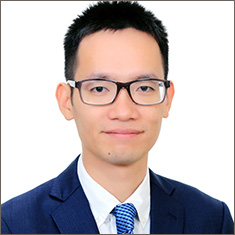Grinnell alumnus connecting the globe with language-interpretation startup
Dec. 19, 2017 — Duc Pham ’07 has always loved learning languages and exploring new cultures.
 Duc Pham '07
Duc Pham '07
As a child in Vietnam, he started learning English at the age of 8. But he didn’t stop there. He went on to master French at Grinnell College, and picked up Japanese and Korean afterwards.
He also majored in economics. Both subjects have been put to good use in Freelensia, Pham’s startup business.
Freelensia is a platform that connects freelance interpreters with companies looking for short-term interpretation services. At freelensia.com, companies can reserve interpreters anytime, anywhere and for any languages.
“I started interpreting part-time about eight years ago,” Pham said. “Later on, I realized there is a great need for short-term language interpreters, and many people could work part-time as an interpreter if they manage their priorities.”
Pham tapped into his experiences at Grinnell to set about connecting interpreters with those seeking interpretations. He operates the business from Ho Chi Minh City, Vietnam.
“My startup career was very much inspired by the pioneer spirit of the school and the life and work of Robert Noyce ‘49, co-inventor of the integrated circuit and co-founder of Intel,” Pham said.
Building the platform had its fair share of challenges. It took a while for Pham and his team to find and set up an online prototype that fit their needs. They also learned that both companies and interpreters were reluctant to some degree to use Freelensia because the concept of reserving interpreters online was new.
“I think the platform has brought a new standard and mindset to the interpretation industry,” Pham said.
Despite obstacles, the site gained 600 members in six months with interpreters in major cities in Vietnam, as well as China and Japan. Interpreters are screened and their credentials are verified. Someone needing an interpreter can look at their profiles and pricing.
The need for interpreters differs drastically between developed and developing countries, Pham said. In developed countries, interpretation needs are often short term. The major use of interpreters typically are court cases, police investigations, and hospital visits.
“In developing countries however, the landscape is different because collaboration with foreign companies is a big part of the economy, and English is not prevalent even in the business world,” Pham said. “As such, interpretation needs are often known in advance and longer term, such as business meetings, factory visits and market inspection trips."
In addition, there are also events for which interpreters are required in any part of the world, Phan said, referencing international seminars, conferences, trade exhibitions, and political meetings.
When Pham first arrived at Grinnell in 2003, 14 percent of the student body was from outside of the U.S. That figure has since increased to 18 percent this school year.
Pham returned to Grinnell in June for Reunion 2017.
“The ambiance was surreal, especially since so many of my classmates came back,” he said. “Oddly, many of them didn’t seem to have aged. I was pleasantly surprised to find many of my classmates have become professors or staff of the College, which shows the dedication they have for Grinnell.”
— by Jeremy Shapiro
For you information:
Freelensia is looking to work with Grinnell alumni and students as interpreters if they can fluently speak more than one language. Those interested can email Pham.